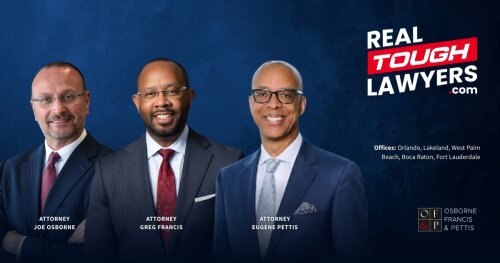Best Native People Lawyers in Boca Raton
Share your needs with us, get contacted by law firms.
Free. Takes 2 min.
List of the best lawyers in Boca Raton, United States
About Native People Law in Boca Raton, United States
Native People in Boca Raton, United States are governed by a unique set of laws and regulations that stem from tribal sovereignty and federal legislation. These laws address various issues related to land rights, tribal governance, cultural preservation, and more.
Why You May Need a Lawyer
You may need a lawyer specializing in Native People law in Boca Raton for situations such as land disputes, tribal membership disputes, criminal defense on tribal land, and navigating complex federal laws that impact Native communities.
Local Laws Overview
Local laws in Boca Raton related to Native People often intersect with federal laws governing tribes and their rights. Understanding these laws is crucial for protecting the rights and interests of Native individuals and communities.
Frequently Asked Questions
1. What is tribal sovereignty?
Tribal sovereignty is the inherent authority of tribes to govern themselves and determine their own laws, without interference from state governments.
2. Can tribal courts hear cases involving non-Native individuals?
Yes, tribal courts can have jurisdiction over non-Native individuals if the offense occurs on tribal land or involves a tribal member.
3. How are tribal lands defined and protected?
Tribal lands are areas designated for Native American tribes by the federal government. These lands are protected under federal law and are not subject to state jurisdiction.
4. Can Native Americans practice their traditional customs and ceremonies freely?
Yes, Native Americans have the right to practice their traditional customs and ceremonies, protected by the American Indian Religious Freedom Act.
5. How can I become a member of a Native American tribe?
The criteria for tribal membership vary by tribe and may include factors such as ancestry, blood quantum, and cultural involvement. Consulting with a lawyer knowledgeable in tribal laws is advisable.
6. What rights do Native American children have in custody cases?
Native American children have specific rights under the Indian Child Welfare Act, which aims to keep Native American families together and preserve cultural ties.
7. Can non-Native individuals own property on tribal land?
Owning property on tribal land as a non-Native individual is possible but subject to tribal laws and regulations. Consulting with a lawyer familiar with tribal property laws is recommended.
8. How can I protect my intellectual property as a Native artist or craftsman?
Intellectual property rights for Native artists and craftsmen can be protected through copyright, trademark, and other legal mechanisms. A lawyer specializing in Native intellectual property can help.
9. What resources are available for Native individuals seeking legal assistance?
There are organizations and legal aid services specifically dedicated to providing legal assistance to Native individuals, such as Native American Rights Fund and Tribal Legal Aid Offices.
10. What is the role of the Bureau of Indian Affairs in Native People law?
The Bureau of Indian Affairs (BIA) is a federal agency responsible for assisting tribes in managing their affairs, enforcing federal laws related to Native Americans, and promoting tribal self-governance.
Additional Resources
For further information and assistance regarding Native People law in Boca Raton, consider reaching out to the Seminole Tribe of Florida, the Miccosukee Tribe of Indians of Florida, and the Native American Rights Fund.
Next Steps
If you require legal assistance pertaining to Native People law in Boca Raton, it's advisable to consult with a lawyer specializing in this field. They can provide guidance and representation to ensure your rights are protected within the unique legal framework governing Native communities.
Lawzana helps you find the best lawyers and law firms in Boca Raton through a curated and pre-screened list of qualified legal professionals. Our platform offers rankings and detailed profiles of attorneys and law firms, allowing you to compare based on practice areas, including Native People, experience, and client feedback.
Each profile includes a description of the firm's areas of practice, client reviews, team members and partners, year of establishment, spoken languages, office locations, contact information, social media presence, and any published articles or resources. Most firms on our platform speak English and are experienced in both local and international legal matters.
Get a quote from top-rated law firms in Boca Raton, United States — quickly, securely, and without unnecessary hassle.
Disclaimer:
The information provided on this page is for general informational purposes only and does not constitute legal advice. While we strive to ensure the accuracy and relevance of the content, legal information may change over time, and interpretations of the law can vary. You should always consult with a qualified legal professional for advice specific to your situation.
We disclaim all liability for actions taken or not taken based on the content of this page. If you believe any information is incorrect or outdated, please contact us, and we will review and update it where appropriate.








